Reply To:
Name - Reply Comment
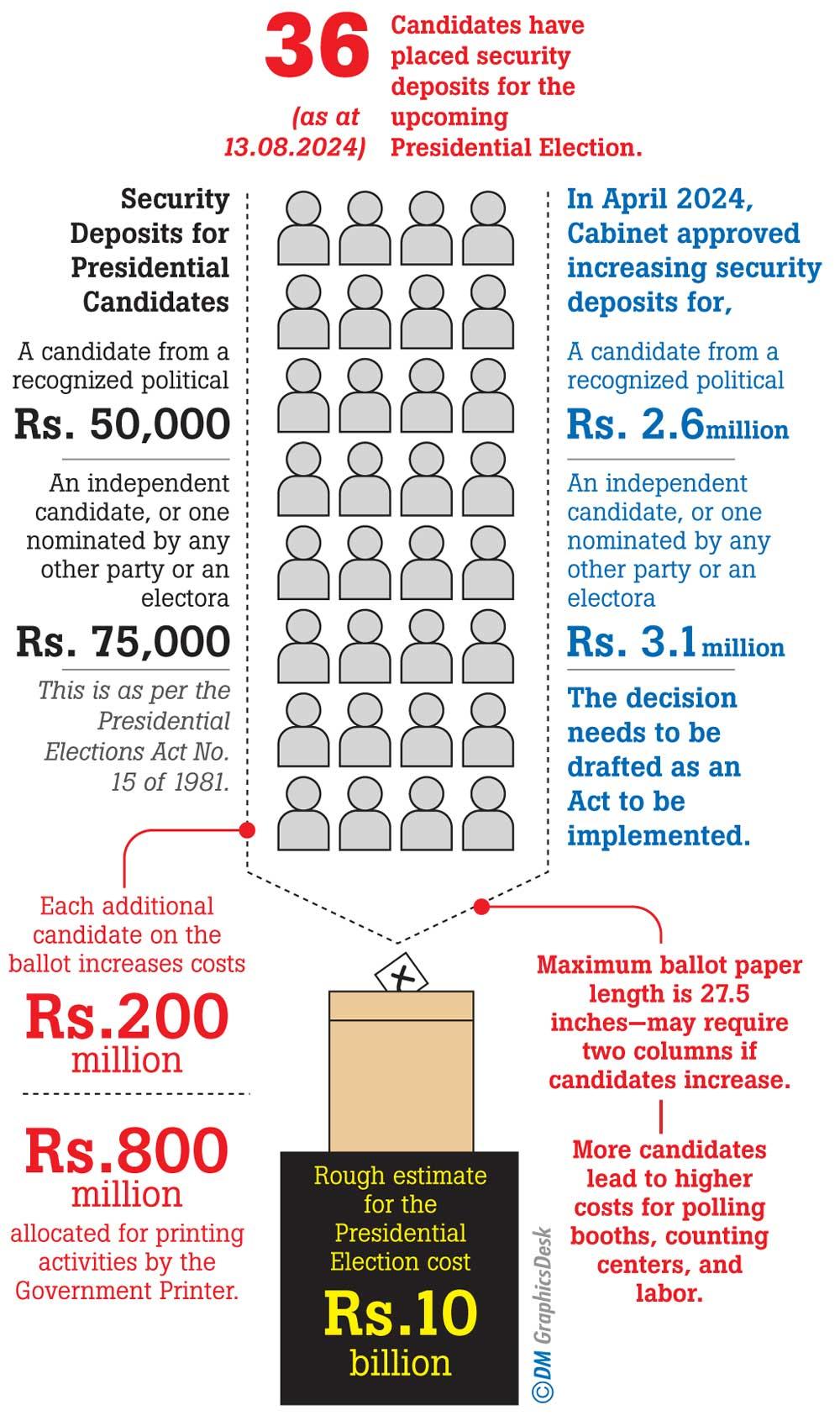
As in every other Presidential race, the public is expected to browse through a long list of candidates before casting their vote during the upcoming Presidential Elections. So far 36 candidates have placed security deposits to contest at the elections. Observers opine that there could be more candidates as the date to accept nominations approaches. But what has been of particular concern is the enthusiasm shown by certain candidates, some who have been regulars on ballot papers during successive elections and whether there are any perks associated with becoming a Presidential Candidate in Sri Lanka. Election observers also propose for mechanisms to disqualify least performing parties and candidates; thereby giving space for deserving parties and candidates to contest at elections.
Dilemma in increasing security deposits
In April 2024, Cabinet approval was granted to increase the security deposit placed by candidates contesting Presidential, Parliamentary and Provincial Council Elections. As such the deposit of a candidate from a recognised political party will be increased to Rs.2.6 million and an independent candidate to Rs.3.1 million, according to the Presidential Elections Act No.15 of 1981. Even though approval had been granted, this decision need to be drafted as an Act in order to be implemented.
According to the legislative process, once cabinet approval is sought, the legal draftsman drafts the legislation in accordance with the Constitution and submits it to the relevant Ministry. This piece of legislation is then presented to Parliament for debates, standing orders and eventually a vote. Thereafter, with majority consensus, it would then be passed in Parliament and be gazetted.
Speaking about the cabinet approval to increase security deposits of candidates, Rohana Hettiarachchi, Executive Director - People’s Action for Free and Fair Elections (PAFFREL) said that the Elections Commission (EC) cannot implement this decision until it has been passed as an Act. “There are personal henchmen, some who campaign for others and extra polling agents who contest as Presidential Candidates. But other than the main two candidates, others would only get around 2% votes. However there are advantages in being listed as a Presidential Candidate as that individual would get more air time on media, enjoy certain advantages during overseas travel and in the issuance of visa and obtain positions from the ruling party. Such incidents have occurred in the past,” said Hettiarachchi.
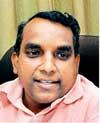
There are advantages in being listed as a Presidential Candidate as that individual would get more air time on media, enjoy certain advantages during overseas travel and in the issuance of visa and obtain positions from the ruling party. Such incidents have occurred in the past
- Rohana Hettiarachchi, Executive Director - People’s Action for Free and Fair Elections
An appeal to monitor candidates
However PAFFREL members have appealed to the EC to monitor Presidential Candidates during the upcoming elections. “Here they could observe how many of these individuals have been real candidates representing real parties. In fact this is a waste of public money. Out of 84 political parties only 20-30 are contesting for the elections. In my opinion the deposits should have been increased and there has to be a legal framework to disqualify candidates and parties that don’t contest,” said Hettiarachchi.
Hettiarachchi further said that if reports are maintained during every election it would be easy to observe candidates who have contested in more than two elections, so that a decision can be taken based on their performances. “There have been candidates who have been contesting from year 2000 onwards. Thereafter they get various positions in parties that they support. But if there’s a mechanism to discredit and disqualify candidates and parties that have poorly performed it would provide space for smaller parties and less popular yet deserving candidates,” he said.
Hettiarachchi further shed light on the political literacy among the public and the situation they would face when having to choose a candidate among a list of 35 or more candidates. “There are symbols that are similar to one another and voters may sometimes be confused. Therefore there should be some criteria beyond the financial limit to prevent such situations from recurring,” he said.
When asked about perks and benefits associated with Presidential Candidates, Hettiarachchi said that apart from publicity they could also contest for ambassadorial and governor positions. “Some could even seek political asylum. It also provides them with an opportunity to promote their political ideology,” he said.
Hettiarachchi added that there needs to be a mechanism to categorise political parties based on their geography, political representation etc. “Democratically, we can’t block anybody from contesting the elections, but from a practical point of view, we are experiencing unnecessary candidates and in fact it is going to be a disaster,” Hettiarachchi warned.
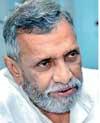
We have to have a qualifying round for contestants. Some criteria could include whether they had received more than 10% votes during the previous Parliamentary elections and those who recommend these candidates could submit affidavits online and thereafter the Commission could check whether these are valid or not
-Mahinda Deshapriya,
Former Elections Commissioner
Proxy candidates a real burden
Former Elections Commissioner Mahinda Deshapriya said that most independent candidates are being used as proxy candidates. “During the previous Presidential Election we allowed 35 candidates to contest. We have to spend on polling booths, counting centres, poll cards and the expenditure depends on the number of candidates. Sometimes we have to pay for counting time as well. There is a high cost being borne for postal votes as well,” said Deshapriya.
He further said that there is a serious problem with regards to proxy candidates. “They contest to support former MPs. Therefore it is difficult to monitor and therefore we have to have a qualifying round for contestants. Some criteria could include whether they had received more than 10% votes during the previous Parliamentary elections and those who recommend these candidates could submit affidavits online and thereafter the Commission could check whether these are valid or not. Some parties genuinely fight for their policies and if there is a qualifying round, it would give them a chance to present these policies in public,” he opined.
When asked about perks and benefits received by Presidential Candidates, Deshapriya said that they would get two policemen to guard them and a little bit of media visibility. “Around 14 million people would see their names in printed letters and that’s all when it comes to perks,” he explained.
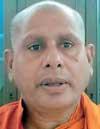
Politicians are constructing roads, distributing water and giving away lands to people in the North, but Buddhists haven’t received anything. Therefore I am contesting on behalf of them
-Battaramulle Seelarathana Thera,
Jana Setha Peramuna
Thoughts of regular contestants
However there are certain candidates who are the first to add their names to the ballot paper, every time a Presidential Election is announced. We asked some of them as to why they aspire to contest, despite getting minimal votes during previous years.
“Contesting with genuine intentions” – Battaramulle Seelarathana Thera
The upcoming Presidential Elections would be the fourth instance that Battaramulle Seelarathana Thera of Jana Setha Peramuna would be contesting for the Presidency. He believes that there needs to be a leader to speak on behalf of the Buddhist community in the country. “Politicians are constructing roads, distributing water and giving away lands to people in the North, but Buddhists haven’t received anything,” he said adding. “Therefore I am contesting on behalf of them.”
Ven. Seelarathana thera received 11, 879 votes (0.09%) during the 2019 Presidential Elections, but is confident that he could still make an impact. He criticised certain independent candidates who are contesting with ulterior motives. “Some of them will be deployed at counting centres. The expenses are so high. With more candidates placing security deposits, the ballot paper will be longer. But the cost would be borne by taxpaying citizens. But it is candidates like us who are contesting with genuine intentions,” the priest said.
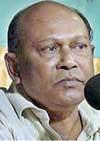
Everybody seems to be going after the IMF, but this is a short term approach. What is needed is a homegrown solution to revive the country’s economy and that is what our party has been advocating for
- Siritunga Jayasooriya,
United Socialist Party
“More candidates indicate signs of prevailing crisis” - Jayasooriya
Another regular candidate contesting for the Presidential Elections is Siritunga Jayasooriya, representing the United Socialist Party. At the 2019 Presidential Elections he was able to secure 3944 votes (0.03%). Speaking to the Daily Mirror, Jayasooriya said that every other candidate has slightly different approaches to emerge from this crisis. “Everybody seems to be going after the IMF, but this is a short term approach. What is needed is a homegrown solution to revive the country’s economy and that is what our party has been advocating for. Therefore we need to educate people. The other matter that we want to address is the national question that is prevailing in the country. Apart from us, nobody has proposed a viable solution with regards to this issue. Some have talked about implementing the 13th Amendment, but these are election gimmicks. However it had only been our party that had advocated on the Right to Self Determination,” he said.
Jayasooriya further claimed that expenditure had doubled in comparison to previous elections. “People are already burdened by the high cost of living. This election will be conducted at the expense of public money. On the other hand it costs around Rs. 2 million to conduct a meeting. Even municipal councilors are in a position to spend around Rs. 100 million. We can’t go beyond that limit and we are contesting with limited resources. We don’t have foreign funds or sponsors,” said Jayasooriya.
He further said having more candidates is a good sign of the crisis that the public is experiencing.
“Someone needs to rescue this country” – Manamendra
Sarath Manamendra of the Nawa Sihala Urumaya is another candidate, contesting at the fourth Presidential Elections. During the 2019 Presidential Elections he received 3380 votes (0.03%). When asked about his reasons to be a candidate in successive elections, he alleged that this country had been robbed by a corrupt political family. “We are sitting on a treasure, but are unable to reap maximum out of it due to corruption and waste of money and resources. Even though Maldives is a country that has no drinking water they only pay Rs. 15.50 for a dollar. But in Sri Lanka, with all natural resources and facilities we pay Rs. 300! This due to corruption. We are indebted to other countries and there’s absolutely no way out. Someone needs to rescue this country and that is why I am contesting at the fourth consecutive Presidential Election,” he said.
When asked about expenses, Manamendra said that his party doesn’t spend on mega rallies, but added that designated teams would go from town to town and conduct pocket meetings that don’t cost much. “We don’t put up posters or cut outs either. But there hasn’t been a significant difference in terms of expenses when compared to previous years,” Manamendra added further.
There is a legal framework that we need to follow. The policymakers are playing a game, but they have to take it seriously. They are wasting our money by dragging debates in Parliament. Since 1981, Presidential Candidates have been placing Rs. 50,000 as a security deposit. All that they had to do was change Rs. 50,000 to Rs. 2.6 million.
- Saman Rathnayaka
Addressing a media briefing, Commissioner General of Elections Saman Rathnayaka said that each additional candidate on the presidential election ballot increases costs by approximately Rs. 200 million. He said that the maximum length of a ballot paper printed at the government press is 27.5 inches. “If the number of candidates increases, names must be printed in two columns. This will limit the number of ballot papers that can fit in a ballot box. In the event that there are more ballot boxes, it would also increase labour and transportation costs as well. for printing activities at the upcoming Presidential Elections.
When asked about the increasing number of candidates and minimal deposits being placed for their candidacy, Rathnayake said that the EC cannot do anything about it. “There is a legal framework that we need to follow. The policymakers are playing a game, but they have to take it seriously. They are wasting our money by dragging debates in Parliament. Then once the regime changes they continue to debate and then there will be more amendments and so on. Since 1981, Presidential Candidates have been placing Rs. 50,000 as a security deposit. All that they had to do was change Rs. 50,000 to Rs. 2.6 million,” said Rathnayake.
Even though it had been estimated that a cost of Rs. 10 billion would be incurred on the Presidential Elections, Rathnayake opines that it is only a rough estimate. According to the Government Printer Ganga Kalpani Liyanage approximately Rs. 800 million had been earmarked